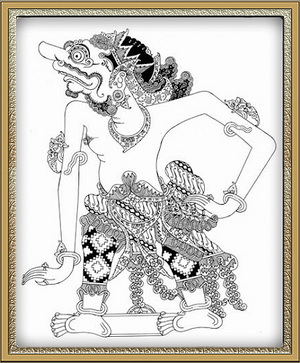Durmagati - (Wayang Kulit): Difference between revisions
No edit summary |
No edit summary |
||
| Line 1: | Line 1: | ||
[[File:Durmagati.jpg|thumb|''Durmagati - son of Prabu Dasarata'']] | |||
[[File:Durmagati.png|thumb]] | |||
{{Puppets | {{Puppets | ||
|Title=Durmagati - (Raden) - Mahabharata | |Title=Durmagati - (Raden) - Mahabharata | ||
Latest revision as of 21:19, 20 November 2024
| Title | Durmagati - (Raden) - Mahabharata |
|---|---|
| Other names | |
| Size | 55 cm |
| Personal data | Durmagati is the third brother of the hundred Korawa. He is the son of Prabu Dasarata of Astina and Dewi Gandari. |
| Appearance | Durmagati is very funny, leading the puppeteer to use this puppet as a clown during the outer scene to criticize his brother the king for being nasty to the five Pandhawa brothers. Durmagati has white palm eyes, a shaped nose like the bow of a boat, an upturned face and a gummy mouth. Permed with hair in the form of dreadlocks. Short long necklace. Edited kembuk kluwih. Ringing, popping and curling. Clothed like a broken barong. In cindai pants. |
| Collection | Private collection |
Durmagati – (Raden) – Mahabharata
After her marriage, Gandari gave birth to a meatball after an unusually long time. Abiasa divided this ball into one hundred equal pieces. There was a small piece left. All pieces were carefully stored in barrels of butter for two years. On the first day of the third year, a day after the birth of the Pandawa brothers, the vessels were opened. A barrel was opened every day. Suyudana, who is also called Duriodana, is the eldest. Next came Dursasana. This continued until on the hundred and first day the girl Dursilawati (also called Dusala) was born. The sons of Dasarata and Gandari are called the Korawa.
Durmagati is not very important puppet, and his role in an all-night shadow puppet performance is very limited to only the Pasebanjawi scene (outer scene) with his other brothers.
In normal plays, Durmagati is not mentioned as a powerful person. But in the Baratayuda war, the average Kaurava became powerful, so did Durmagati. At first he continued to succeed in the war, but in the end he was also defeated by Pendawa.
The Kauravas generally dress beautifully and wear broken batik cloth which indicates that they are great knights.
Source: History of Wayang Purwa - Hardjowirogo - PN Balai Pustaka - 1982


